Supreme Court
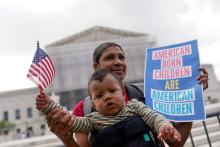
The Supreme Court dealt a blow on Friday to the power of federal judges by restricting their ability to grant broad legal relief in cases as the justices acted in a legal fight over President Donald Trump's bid to limit birthright citizenship, ordering lower courts that blocked the policy to reconsider the scope of their orders.

The Supreme Court has unanimously dismissed a case that would have limited access to mifepristone, one of the two drugs used in a medication abortion. The decision leaves access to the abortion drug unchanged for now.
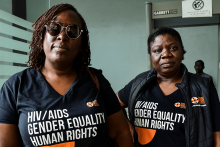
Uganda’s constitutional court refused on Wednesday to annul or suspend an anti-LGBTQ+ law that includes the death penalty for certain same-sex acts, but voided some provisions that it said were inconsistent with certain fundamental human rights.

A RELATIVELY NEW front in the culture wars is emanating from the realm of finance: the push to increase financial investments that take into account “environmental, social, and governance” considerations. What is known in the finance industry as ESG has grown considerably over the past decade. According to the Global Fossil Fuel Divestment Commitments Database, the amount of wealth divested from fossil fuels worldwide has grown from $52 billion in 2014 to more than $40 trillion last year. But the increased visibility and prominence of ESG investing has triggered a backlash, with at least seven GOP-controlled states enacting anti-ESG policies and 15 others introducing bills to disallow the application of ESG principles in state investments such as pensions.
The anti-ESG push is coming from the usual suspects. Texas is heavily involved, due to the prominence of the fossil fuel industry in the state’s economy. Right-wing groups such as the Heritage Foundation and the American Legislative Exchange Council have also been big promoters of model anti-ESG legislation. West Virginia Attorney General Patrick Morrisey has formed a coalition with more than 20 of his counterparts to challenge the Securities and Exchange Commission’s ability to implement a climate disclosure rule, a case that could end up at the Supreme Court and hobble the executive branch’s ability to interpret and act on congressional statutes. Apparently, many conservative activists and politicians are only champions of the “free market” when it advances their ideological agendas.

The U.S. Supreme Court on Thursday struck down race-conscious student admissions programs at Harvard University and the University of North Carolina in a sharp setback to affirmative action policies often used to increase the number of Black, Hispanic, and other underrepresented minority groups on campuses.
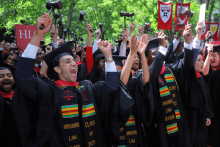
I’m proud to say that I benefitted from affirmative action. These policies, sometimes called “race conscious admission policies,” allow colleges and universities to address unequal access to educational opportunities by taking different aspects of a student’s background, including race, into account among other admission factors. But even with affirmative action in place, in 1994 I joined fewer than 25 other Black men in a freshman class of over 1,000 students at Emory University.
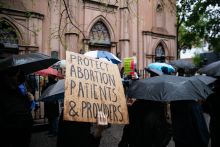
After the June 2022 Supreme Court ruling in Dobbs v. Jackson Women’s Health Organization which overturned Roe v. Wade,the landscape of abortion access in the U.S. shifted dramatically. In the past year, many Republican state governments have moved to further restrict or fully outlaw abortion, while some states with Democratic legislatures and/or governors have written abortion protections into law. In every state, pregnant people face difficult decisions and shifting barriers to receiving abortion care.

On April 18, the court heard oral arguments in Groff v. DeJoy, a case addressing an employer’s obligation to accommodate religious employees’ requests under federal law. The dispute involves a Christian postal worker who quit his job and sued the U.S. Postal Service after he was unable to find coverage for his Sunday shifts. Current law requires employers to make accommodations for workers’ religious requests only if doing so doesn’t impose more than a minimal cost on their business, known as the “de minimis” standard.
After listening to the oral arguments in the case, I believe it’s very likely the court will overturn the de minimis standard and require employers to accommodate more religious requests.

The Supreme Court’s conservative majority signaled sympathy on Monday toward an evangelical Christian web designer whose business refuses to provide services for same-sex marriages in a major case pitting LGBTQ rights against a claim that freedom of speech exempts artists from anti-discrimination laws
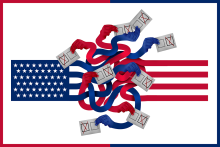
JUST AS FOR 50 years Ohio was a bellwether for presidential elections, since 2011 North Carolina has become a testing ground for Far Right legislation aimed at controlling federal election administration. In his book Indecent Assembly, author Gene R. Nichol says North Carolina is now “a laboratory for extremism.”
In September, the Supreme Court included on its docket a Republican-backed case out of North Carolina that pits voters against a state legislature that seeks to greatly increase its power over elections by limiting the ability of the state judiciary to review the actions of the legislature. This could potentially unbalance the fundamental checks and balances essential to a functioning democracy by giving one body total control over a function of government.
While the specific case of Moore v. Harper deals with whether the North Carolina state Supreme Court has the power to strike down state legislation that produced illegally gerrymandered voting districts, the federal Supreme Court will deliberate on whether the U.S. Constitution’s election clause, the primary source of constitutional authority to regulate elections, prevents a state judiciary from ordering a state legislature to comply with federal election laws.

Whether the restrictions that undermine compassionate decision-making are imposed by law or systemic inequalities such as poverty, the moral imperative to support careful, compassionate decision-making should drive public policy away from any such restrictions.
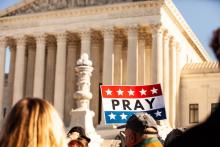
Today, Christians are continuing to pursue their political interests while imagining that God is fighting on their side. In the wake of the Court overturning Roe v. Wade, many conservative Christian leaders celebrated the decision as bringing about God’s kingdom on earth. On the other side of the pew, progressive Christians lamented the decision because of the devastating implications it holds for human rights both now and in the future. This leads me back to the question I asked myself in the wake of the Supreme Court rejecting Trump’s bid to eliminate DACA: Is God in control of the Court?

Amid the avalanche of rogue supreme court decisions that have come out in the past few months, there’s one that has slid under the radar: West Virginia v. EPA.

I have been ruminating on the significance of being a pro-choice Black clergywoman in a post-Roe United States. I understand how this may sound subversive despite the fact that two-thirds of American women disapprove of the Supreme Court’s decision last Friday to overturn Roe v. Wade. To some people, it’s incompatible that I could be a minister and support someone’s right to choose to have an abortion.
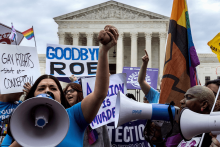
The Supreme Court overturned 49 years of federal abortion rights on Friday, in its decision on Dobbs v. Jackson Women’s Health Organization. Faith leaders and advocates told Sojourners they were not surprised by the court’s decision, which was nearly identical to the draft leaked in May. However, many leaders echoed Rev. Katey Zeh, CEO of the Religious Coalition for Reproductive Choice, who told Sojourners that “the emotional impact of a moment like this can’t be underestimated.”
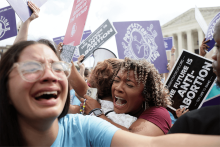
The U.S. Supreme Court on Friday took the dramatic step of overturning the landmark 1973 Roe v. Wade ruling that recognized a woman's constitutional right to an abortion and legalized it nationwide, handing a momentous victory to Republicans and religious conservatives who want to limit or ban the procedure.
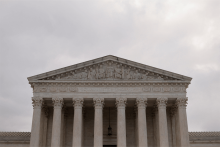
The U.S. Supreme Court on Tuesday allowed more public funding of religious entities in an important ruling in favor of two Christian families who challenged a Maine tuition assistance program that excluded private schools that promote religion.
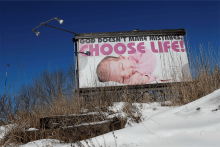
Sharing my story about anything related to abortion causes me to worry for many reasons: For one, in the evangelical context I grew up in, “pro-choice” might as well have been a four-letter word. Secondly, it’s fair to wonder, “What does this dude from New Hampshire, who has had no personal experience with abortion, think he has to offer to this contentious, decades-long debate?” But that’s kind of what this story is about — it’s not what I know about abortion, but what I didn’t.

Deeply flawed and alarming. That was my reaction last week as I read the leaked draft of the Supreme Court opinion that would repeal Roe v. Wade, unravelling nearly 50 years of judicial precedent and placing abortion rights into the hands of state lawmakers.
